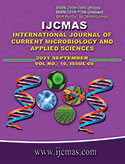


 National Academy of Agricultural Sciences (NAAS)
National Academy of Agricultural Sciences (NAAS)

|
PRINT ISSN : 2319-7692
Online ISSN : 2319-7706 Issues : 12 per year Publisher : Excellent Publishers Email : editorijcmas@gmail.com / submit@ijcmas.com Editor-in-chief: Dr.M.Prakash Index Copernicus ICV 2018: 95.39 NAAS RATING 2020: 5.38 |
Agribusiness is one of the areas with the greatest impact, which, due to the processes involved within this area, generates waste that, given its composition, is used in optimal materials to be used for degradation methods in the production of composting, different microorganisms such as Pseudomonas, Bacillus, Aspergillus help in the decomposition of waste from agribusiness, the metabolic activity of these microorganisms allows the degradation of animal and plant tissues such as cellulose, starch, pectin, proteins, agar that intervene in nitrification and nitrogen fixation processes, for the degradation process it is necessary to carry out in composting beds of organic waste isolated with strains of the rhizosphere from the natural forest of CIPCA the strains use the dimensions of 4 x 1 x 1 giving a city layer of 4ð‘š3 or about 640 kg of organic rough which are covered with geo mucosa, surrounded by gutters to collect leachate two produced by the effect of degradation, this process of degradation of organic matter allows to obtain a product with characteristics such as earthy odor, texture and uniform structure, where a pH close to neutral was registered in the control beds, gradually increasing from that moment with slightly alkaline values where it does not present characteristics of the initial organic matter, reducing the volume by 35%, for this the objective is to maintain Controller of certain parameters of temperature, humidity, pH, compost ratio and organic matter content.
 |
 |
 |
 |
 |